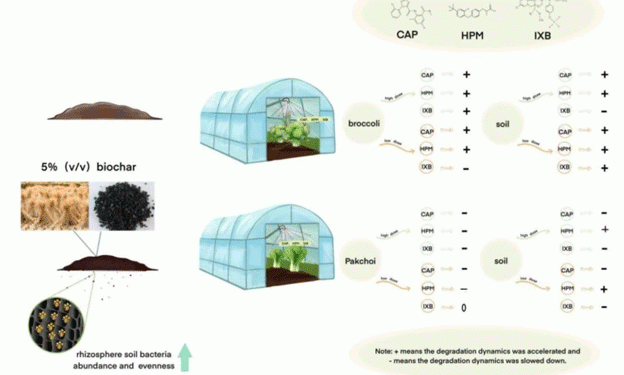The use of biochar in agricultural soils has gained considerable attention due to its potential to enhance soil health, improve crop yields, and reduce environmental pollution. In greenhouse vegetable production, biochar’s ability to influence pesticide degradation and soil bacterial communities is of particular interest. A recent study delved into the impact of biochar on the degradation rates of three pesticides—CAP, HPM, and IXB—across different vegetable crops and its subsequent effects on soil bacterial richness and diversity under greenhouse conditions.
Biochar, a carbon-rich material derived from the pyrolysis of organic matter, has been recognized for its ability to adsorb pesticides and other contaminants, potentially reducing their mobility and environmental persistence. However, the effects of biochar on pesticide degradation are not uniform and can be influenced by several factors, including the type of biochar, the pesticide in question, the crop type, and the specific characteristics of the soil.
Biochar and Pesticide Degradation
In the study, researchers examined the effects of rice husk biochar (RB) on the degradation of three pesticides: CAP (a highly soluble pesticide), HPM (another soluble pesticide), and IXB (with reduced mobility). The crops studied included broccoli and pakchoi, two vegetables commonly grown in greenhouse conditions.
For broccoli, the results demonstrated that RB application at a rate of 25.00 t ha−1 significantly accelerated the degradation of CAP and HPM. This was attributed to the enhanced bacterial abundance in the rhizosphere, which promoted the breakdown of these pesticides in both the broccoli plants and the surrounding soil. Interestingly, the degradation of IXB was less affected by biochar, likely due to its lower solubility and reduced mobility in the soil.
In contrast, pakchoi showed a different response. The biomass of pakchoi increased considerably during the late growth stage, but RB application did not significantly affect the degradation of the three pesticides. However, CAP and IXB exhibited reduced mobility in the soil, indicating that biochar effectively adsorbed these pesticides, potentially preventing them from leaching into groundwater. HPM, due to its high solubility, continued to degrade more easily in the presence of biochar.
Impact on Soil Bacterial Communities
One of the notable findings of the study was the impact of biochar on soil bacterial communities. The addition of biochar altered both the richness and diversity of the bacterial population in the rhizosphere soil. This shift in bacterial ecology is significant because soil bacteria play a crucial role in the degradation of organic compounds, including pesticides. By promoting a more diverse and abundant bacterial community, biochar enhances the soil’s natural capacity to break down pesticides, thereby reducing their environmental impact.
The interaction between biochar, soil bacteria, and pesticides is complex but holds promise for reducing nonpoint source pollution from agricultural activities. Biochar’s ability to adsorb and immobilize pesticides, combined with its positive effects on soil microbial communities, suggests that it could be an effective tool for mitigating pesticide contamination in greenhouse environments.
Recommendations for Greenhouse Farming
Based on the findings, biochar application at a rate of 25.00 t ha−1 is recommended for broccoli production in greenhouse conditions to enhance pesticide degradation and promote food safety. This practice could help reduce the environmental footprint of pesticide use by accelerating the breakdown of soluble pesticides like CAP and HPM while also supporting healthier soil ecosystems. For crops like pakchoi, where biochar’s effects on pesticide degradation were less pronounced, further research may be needed to optimize application rates and strategies.
Overall, biochar represents a valuable addition to sustainable agricultural practices, particularly in controlled greenhouse environments where the risks of pesticide contamination are heightened. By integrating biochar into greenhouse vegetable production, farmers can improve both crop yields and environmental outcomes.
Biochar’s ability to influence pesticide degradation and enrich soil bacterial communities offers a promising avenue for sustainable greenhouse farming. For highly soluble pesticides such as CAP and HPM, biochar can significantly accelerate degradation, enhancing food safety and reducing environmental pollution. The recommended application rate of 25.00 t ha−1 for biochar in greenhouse broccoli production could serve as a model for other crops and regions. As agricultural practices continue to evolve, biochar may play an increasingly important role in balancing productivity with environmental stewardship.










